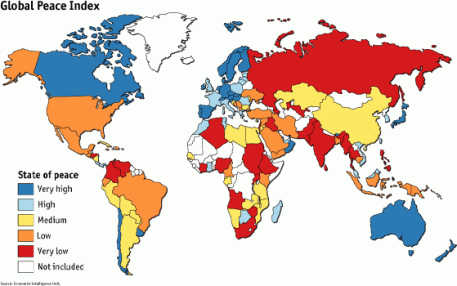Peace geographies: the Global Peace Index
 “The real voyage of discovery consists not in seeking new landscapes but in having new eyes.” — Marcel Proust
“The real voyage of discovery consists not in seeking new landscapes but in having new eyes.” — Marcel Proust
The world contains both relative peaceful oases as well as conflict hotspots, often within the same country and region. Applying more holistic measures and definitions of peace and security such as environmental sustainability and social justice, one is afforded a more nuanced picture of societal peace on the globe.
One such new measure is the Global Peace Index (GPI), launched on 30th May. The world’s first index measuring peace, it uses metrics that combine both internal and external indicators of peacefulness.
More qualitatively, it takes as its starting point the sensible premise that one would do well to study health rather than just disease. As we know, peace is far more than simply the absence of war, which the GPI measures, but it is a valuable push-start to identifying and applying more of the drivers and dynamics of peace.
Just as a combination of endogenous and exogenous factors has an important part to play in the casting of true peace and security, a more holistic framing of what living peacefully means is clearly required — eschewing narrow military definitions and recognising healthy indicators in such important factors as civil society and equitable access to clean water.
The Index was the brainchild of Australian entrepreneur and philanthropist Steve Killelea and developed by the Economist Intelligence Unit; 121 countries were examined in the study. Visit the website for more information.
As a more complex mosaic of political and cultural complexity of international and internal affairs emerges, there may be some surprises —
Top Three
1. Norway
2. New Zealand
3. Denmark
In the Top 50, we have 6 countries or a healthy 10%+ of the rankings from the Middle East and North Africa — Oman, Tunisia, United Arab Emirates, Kuwait, Morocco and Qatar. If Africa is taken geographically, we can add 3 countries from the top fifty — Botswana, Ghana, Mozambique and Madagascar just off the mainland.
From Eastern Europe there are 9 countries represented in the Top Fifty; Asia and Oceania 10 countries; 5 from the Americas, North and South; and 16 from Continental and Northern Europe. See the full list of country rankings here, as well as two longer reports extrapolating from these findings here.
I haven’t mentioned how the USA or Australia ranked, so visit the website for more. There are three Anglophone countries in the Top Ten (well, maybe one and a half, as two of the countries are largely bi-lingual).
Bottom Three
119. Israel
120. Sudan
121. Iraq


norway are always top of these things. i always want to go there to see what they are doing right that everyone else isnt.
Wooohoo! US beat Iran by one place! Take that Homey!
Norway does indeed always seem to come out on top in this things, often followed by the rest of Scandinavia; sad that the rest of us don’t seem to learn from their example.
However, one very interesting league table where Norway isn’t on top is that of the Happy Planet Index, which measures sustainable quality of life (Human Development Index / Ecological Footprint, corrected for population). Most of the world does pretty badly, either because of too much poverty or too much ecological footprint; the best performing region is actually not Scandinavia (whose footprint is smaller than many, but still too big), but Latin America. Go figure.
well, the few things i know about the system in scandinavian countries is that tax and welfare are significantly higher than in most other places, they start school a year or two later and that they tend not to waste exorbitant amounts of money on ill advised unnecessary invasions of other countries
That would certainly add to everyone’s happiness. Excepting, of course, the arms manufacturers who are, unfortunately and with pun intended, making a killing.
By dint of still effectively operating as a ‘permanent arms economy’, a lot of Americans are employed and dependent for their livelihoods upon the armaments and aerospace industry ‘gun belt’ in the US, so peace conversion will be an ongoing challenge for the economy. While it may act as an economic stimulus in the short term, in the long term, the military industrial complex arguably has a highly deleterious effect on the economy as Michael suggested, diverting much needed money away from education, health and infrastructure.
Perhaps now more than ever that only slightly simplified truism still holds — that whereas once arms were manufactured to sell for war, wars are now manufactured to sell arms.
Thanks for the Happy Planet Index ranking countries on human wellbeing and environmental impact, Dave. All of these alternative measures help to stimulate the propositional mode of thinking, and remind us what we can all strive towards and do better. I’m not surprised to see Latin American countries figure prominently in the three aggregated indices of Environmental Footprint, Life Satisfaction, and Life Expectancy, but there were some other surprises.
Pingback: Monte Asbury’s Blog Ponder the Global Peace Index «
I hope you folk will keep an eye out for the peace commission bill when it hits public submission time.
We tried to support the anti-cluster bomb bill. 2 submissions loved the bombs, and only 13 submissions supported the bill, so the government squished it. Would they have been able to do that if every one of your readers (I’m assuming at least a couple of hundred) had said how you hate cluster bombs? Would it take a 100:1 or 1000:1 ratio for the government to be too embarrassed to ignore the desire of most people for peace?
Nevertheless, this site just made my blogroll.
Dave,
Thanks very much indeed for bringing this to the attention of my readers. I’ve also circulated your post to many good people who will be interested in it in Sydney via a group list aligned with the Centre for Peace and Conflict Studies, Sydney, hope that’s OK.
I’ll write more after a proper read at your blog, also added your great site to the blogroll.
cheers
Ann
PG: Thx for complement.
OK? B* fantastic.
I’m assuming this is the Sydney Uni group thats part of VisionOfHumanity/GPI (yeah, kinda weirdly, it’s still on my economics links page as it’s under TheEconomist/EIU), and when I came across VoH a couple of weeks after I got the draft from Lyn Allison, I referred her to the VoH/GPI and mentioned the Sydney folk (and the endorsement list which is pretty mindblowing). Haven’t heard back, but then I know how mad it’s been in Canberra.
I’m hoping at least one or two of your circle will be able to put contribute/nitpick my thoughts as I scratch them on my blog (just like I did with the Citizenship Testing bill, but got no sanity checking from anyone).
And I’ll match your story of bigotry (?SCA?) with this submission to the Citizenship Testing Bill committee from “Australia for Australians”… scary!
Thx again
Since you were interested, the Peace Commission bill has been through it’s first reading, so it won’t be long before public comments open (and close a day or so later). Notes and pointers to a review a month ago (probably not too different to new version) here
Thanks for pointing to the time-factor. Call to action noted! I’ll get to this shortly, and endeavour to impress it upon others. I’ll read the submission with interest.
Actually, it’s probably a week between ad and close of comments, it just feels like a day or two from the time you find out about it. I’ve created a page for sanity checking preliminary thoughts here (unless someone has one better). Any and all welcome.